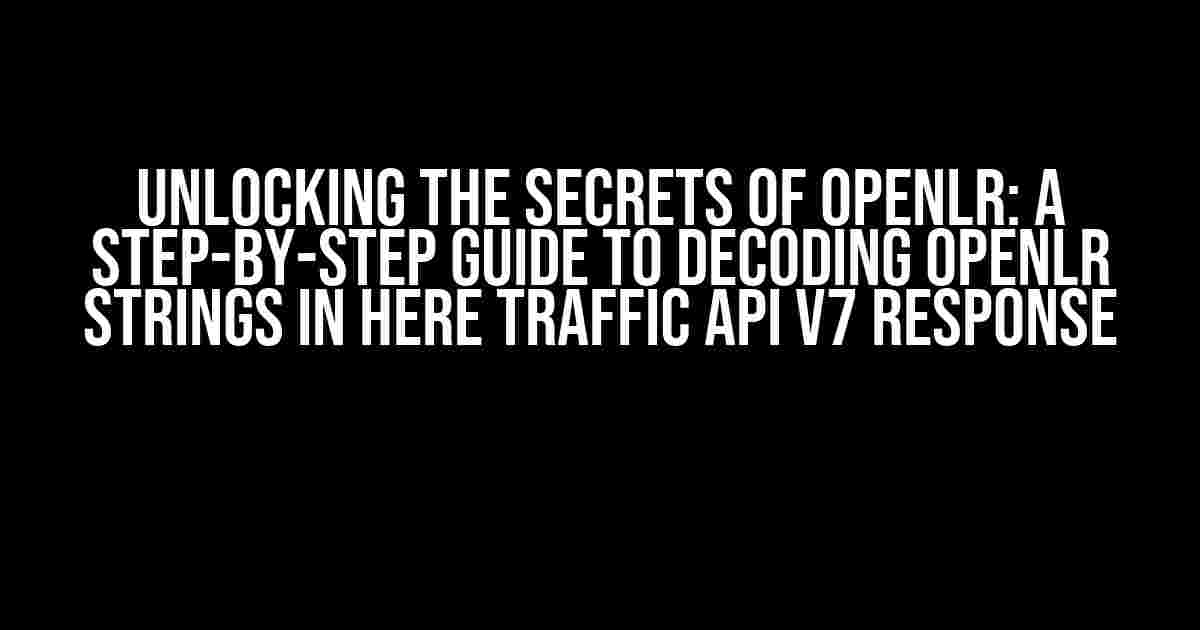Are you tired of scratching your head, trying to figure out how to decode the OpenLR string in your HERE Traffic API v7 response? Well, you’re in luck! In this article, we’ll take you on a journey to demystify the world of OpenLR and show you exactly where to find the libraries to decode those pesky strings.
What is OpenLR, Anyway?
Before we dive into the nitty-gritty, let’s take a quick look at what OpenLR is all about. OpenLR (Open Location Reference) is an open standard for encoding and decoding location references. It’s a compact and efficient way to represent locations on the earth’s surface, making it perfect for use in traffic and mapping applications.
Why Do I Need to Decode OpenLR Strings?
When you receive a response from the HERE Traffic API v7, you might notice that the location information comes in the form of an OpenLR string. This string contains valuable information about the location, such as the latitude, longitude, and direction of traffic flow. However, to make sense of this string, you need to decode it using a specialized library.
The Quest for the Elusive OpenLR Library
So, where can you find the libraries to decode OpenLR strings? Fear not, intrepid developer, for we’ve got you covered! Here are a few options to get you started:
Option 1: HERE SDK for Android and iOS
If you’re developing a mobile app using the HERE SDK for Android or iOS, you’re in luck! The SDK comes with built-in support for OpenLR decoding. You can use the `OLRDecoder` class in the SDK to decode OpenLR strings with ease.
OLRLocation olrLocation = new OLRLocation("HERE.isOpenLR.1234567890abcdef");
OLRDecoder decoder = new OLRDecoder();
OLRCoordinate coordinate = decoder.decode(olrLocation);
double latitude = coordinate.getLatitude();
double longitude = coordinate.getLongitude();
Option 2: OpenLR Java Library
If you’re developing a Java-based application, you can use the OpenLR Java library to decode OpenLR strings. This library is available on GitHub and can be easily integrated into your project.
<dependency>
<groupId>com.here&</groupId>
<artifactId>openlr-java</artifactId>
<version>1.0.0</version>
</dependency>
Once you’ve added the dependency to your project, you can use the `OpenLRDecoder` class to decode OpenLR strings:
OpenLRDecoder decoder = new OpenLRDecoder();
OpenLRLocation location = decoder.decode("HERE.isOpenLR.1234567890abcdef");
double latitude = location.getLatitude();
double longitude = location.getLongitude();
Option 3: OpenLR C++ Library
If you’re developing a C++-based application, you can use the OpenLR C++ library to decode OpenLR strings. This library is available on GitHub and can be easily integrated into your project.
git clone https://github.com/openlr/openlr-cpp.git
Once you’ve cloned the repository, you can use the `olr::decode` function to decode OpenLR strings:
olr::OLRDecoder decoder;
olr::OLRLocation location = decoder.decode("HERE.isOpenLR.1234567890abcdef");
double latitude = location.getLatitude();
double longitude = location.getLongitude();
A Brief Interlude: Understanding OpenLR Strings
Before we proceed, let’s take a quick look at the anatomy of an OpenLR string. An OpenLR string consists of three main parts:
- Header: The first part of the string, which contains information about the OpenLR version and the location reference.
- Location Reference: The second part of the string, which contains the actual location information, such as the latitude and longitude.
- Checksum: The third part of the string, which contains a checksum to verify the integrity of the location reference.
Understanding the structure of an OpenLR string can help you better appreciate the decoding process.
Decoding OpenLR Strings: A Step-by-Step Guide
Now that we’ve covered the various libraries available for decoding OpenLR strings, let’s take a step-by-step look at the decoding process:
- Parse the OpenLR string: Break down the OpenLR string into its constituent parts, including the header, location reference, and checksum.
- Extract the location reference: Extract the location reference from the OpenLR string, which contains the actual location information.
- Decode the location reference: Use the chosen library to decode the location reference, extracting the latitude, longitude, and other relevant information.
- Verify the checksum: Verify the checksum to ensure that the location reference has not been tampered with or corrupted during transmission.
- Use the decoded information: Use the decoded location information in your application, such as displaying the location on a map or calculating distances and routes.
Conclusion
Decoding OpenLR strings in a HERE Traffic API v7 response may seem like a daunting task, but with the right libraries and a little know-how, you can unlock the secrets of OpenLR and extract valuable location information. Remember to choose the right library for your programming language and follow the step-by-step guide to decoding OpenLR strings.
By mastering the art of OpenLR decoding, you’ll be able to build more accurate, more efficient, and more powerful location-based applications that delight and amaze your users. So, what are you waiting for? Get decoding!
| Library | Language | Description |
|---|---|---|
| HERE SDK for Android and iOS | Android and iOS | Comes with built-in support for OpenLR decoding. |
| OpenLR Java Library | Java | A Java-based library for decoding OpenLR strings. |
| OpenLR C++ Library | C++ | A C++-based library for decoding OpenLR strings. |
Happy coding!
Frequently Asked Question
Getting stuck on decoding OpenLR strings in HERE Traffic API v7 responses? We’ve got you covered!
Where can I find libraries to decode the OpenLR string in a HERE Traffic API v7 response?
You can find OpenLR libraries for various programming languages on the HERE Developer Portal, specifically in the OpenLR Developer Guide. These libraries will help you decode OpenLR strings and extract the necessary information from the HERE Traffic API v7 responses.
Are there any OpenLR libraries available for Java?
Yes, there are OpenLR libraries available for Java! You can find the Java library in the HERE OpenLR GitHub repository. This library provides a simple way to decode OpenLR strings and extract the necessary information in your Java applications.
Can I use OpenLR libraries with Python?
You bet! The HERE OpenLR library is also available for Python. You can find it in the HERE OpenLR GitHub repository. This library provides a convenient way to decode OpenLR strings and integrate them into your Python applications.
Do I need to register for a HERE Developer account to access the OpenLR libraries?
Yes, you need to register for a HERE Developer account to access the OpenLR libraries. Registration is free and provides access to the HERE Developer Portal, where you can find the OpenLR libraries, documentation, and other resources to help you get started with the HERE Traffic API v7.
Are the OpenLR libraries compatible with all HERE Traffic API v7 responses?
Yes, the OpenLR libraries are designed to work with all HERE Traffic API v7 responses that contain OpenLR strings. The libraries provide a standardized way to decode OpenLR strings, ensuring compatibility with all responses, regardless of the programming language or platform you’re using.



